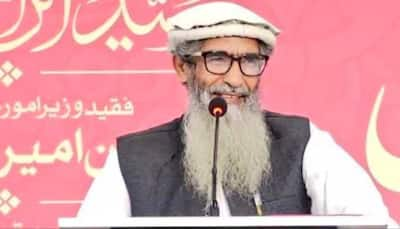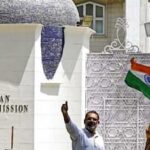Amir Hamza, one of the founding members of the banned terrorist group Lashkar-e-Taiba (LeT) and an important ideologue of the group, was hospitalised after an incident at his house in Lahore, reported media. Referring to pro-Lashkar Telegram groups, a Times of India report stated that Hamza’s wounds were termed by sympathisers as the outcome of an “accident.” The circumstances of the incident, however, are still not clear, and Pakistani officials have made no official statement.
Hamza, 66, is said to be getting treatment at a military hospital in Lahore, where security has been severely bolstered. He is reportedly under close watch by Pakistan’s Inter-Services Intelligence (ISI), with tight control over access to the hospital.
The news comes mere days after senior LeT recruiter Abu Saifullah was murdered by unidentified attackers in Pakistan, leading to speculations on enhanced vulnerabilities on the part of LeT leadership. Saifullah, also referred to as Nizamani, was being protected by the government but was fatally attacked near a road crossing in Matli while he had just left his residence.
An old hand at the Afghan jihad, Hamza has been one of LeT’s prime ideologues for years, famous for his impassioned speeches and extremist writings. His books, such as the 2002 title Qafila Da’wat aur Shahadat (“Caravan of Proselytising and Martyrdom”), have helped spread LeT’s extremist ideology. He has also been the editor of LeT’s in-house magazine.
Following the 2018 financial crackdown against LeT-affiliated charities Jamaat-ud-Dawah and Falah-e-Insaniat Foundation, Hamza is said to have publicly distanced himself from LeT and introduced a splinter group, Jaish-e-Manqafa, which is believed to have conducted militant activities in Jammu and Kashmir.
Hamza is now listed as a global terrorist by the US Treasury Department, which calls him a key player in LeT’s fundraising, recruitment, and attempts to get jailed operatives released.
The attack also followed a time of increased tensions between India and Pakistan, in the aftermath of India’s Operation Sindoor, a series of targeted strikes carried out from May 7 to May 10 on terror camps in Pakistan and Pakistan-occupied Kashmir (PoK). The operation was initiated in retaliation against the April 22 terror attack in Pahalgam, Jammu and Kashmir, which killed 26 civilians, the majority of whom were tourists.
The cross-border operation generated almost 100 hours of escalated hostilities, among the most severe escalations between the nuclear-armed neighbours in recent times. There was a declared ceasefire on both sides on the night of May 10.
While suspicions are mounting about the internal security of Pakistan-based terror groups, the Amir Hamza case could presage more turmoil among extremist ranks even as regional tensions hang delicately poised.
Amir Hamza, alias Maulana Ameer Hamza, is a key co-founder and head ideologue of the banned terror group Lashkar-e-Taiba (LeT). Hamza was born on May 10, 1959, in Gujranwala, Punjab province of Pakistan. He is an Afghan jihad veteran and key figure in the development of LeT’s extremist ideology.
Renowned for his impassioned oratory and prolific writing, Hamza played a key role in molding Lashkar’s propaganda apparatus. He was the editor of the organization’s official magazine and actively contributed to spreading its ideological discourses. In 2002, he wrote the widely distributed militant pamphlet Qafila Da’wat aur Shahadat (“Caravan of Proselytizing and Martyrdom”), which outlined the group’s vision for global jihad.
Prior to taking up his propaganda role, Hamza was a functional militant and is reported to have been active in India in the early 2000s. He is accused of being involved, along with murdered operative Abu Saifullah, in planning the 2005 terror strike on the Indian Institute of Science (IISc) in Bengaluru—one of the earliest major LeT attacks in India outside Kashmir.
In response to global pressure and financial repression against LeT and its front groups such as Jamaat-ud-Dawah and the Falah-e-Insaniat Foundation, Hamza broke away from the group in 2018. He subsequently started a splinter group known as Jaish-e-Manqafa, which is said to have maintained small-scale fundraising and propaganda activities, particularly targeting Jammu and Kashmir.
Hamza is still a US Treasury sanctions-listed designated terrorist and high-value target because of his long involvement in recruitment, ideological indoctrination, and LeT logistics spanning decades.
His recent hospitalisation in Lahore, under close security arrangements by Pakistan’s Inter-Services Intelligence (ISI), has again highlighted his sustained influence and the nuanced dynamics of Pakistan’s terror networks.
Stay informed on all the , real-time updates, and follow all the important headlines in and on Zee News.








